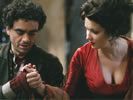Eye For Film >> Movies >> La Bohème (2008) Film Review
Given that Puccini wrote some of the most cinematic operas in the classical canon – usually involving doomed love, exotic locations and at least one tragic death – it’s a surprise he’s not been given the big screen treatment more often.
Whereas Mozart and Verdi have been tackled regularly with varying degrees of success (from Joseph Losey’s arthouse take on Don Giovanni and Zeffirelli’s majestic interpretation of Otello, through to last year’s flawed but sumptuous version of The Magic Flute by Kenneth Branagh) this is the first cinematic sighting of the classic tale of love, death and leather-lunged arias in the Latin Quarter for many a year.

Sadly, I don’t think it’s going to lead to a flood of new adaptations. Dornhelm’s approach to the work is tasteful, reverential and just a teensy bit dull, serving mainly as a permanent record of opera’s current dream pairing, Netrebko and Villazon.
They’ve been packing the crowds in for years and there are plenty of DVDs of their stage performances, so putting them together in a proper film must have seemed the logical next step. But for this particular art form to work on screen there needs to be a real visual flair at work, an opening out of the concert stage to tempt in the casual cinemagoer and persuade the opera buff that it offers something more than the next Royal Opera House production.
Branagh, Zeffirelli and Losey all managed it in various ways, but for large chunks of this film Dornhelm seems content to merely point the camera at the performers while they stand there and sing. When he does try something a bit tricksy – starting in black and white, then fading into colour, or having a single splash of colour in a monochrome scene – it’s to no discernible purpose or effect.
Happily, the story still survives. It’s become the stuff of cliché now, but the figure of the tormented, impoverished writer, burning his manuscript to keep warm remains a potent one. And to his credit, Villazon does actually look the part – lean, pale and unkempt, his Rodolfo could genuinely be a man on the verge of starvation, unlike some of the strapping, pasta-and-vino reared tenors I’ve seen essay the role on stage over the years.
In contrast, when Netrebko’s consumptive sewing girl Mimi first appears she looks as though she’s come straight from a Vogue cover shoot. Hardly surprising that Rodolfo is instantly smitten and when they do their first duet the main point of the exercise becomes clear – they can’t half carry a tune, obviously, but as actors they really strike sparks off each other too, creating a genuine erotic charge as they embrace passionately on the stairs.
Dornhelm keeps the buzz going through a riotous cafe scene, where Rodolfo’s worship of the ethereal Mimi is contrasted with the earthy passion of his painter friend Marcello (von Bergen, though the role is sung by Boaz Daniel) for the coquettish Musetta (Cabell). But as the relationship is blighted by Mimi’s illness and Rodolfo’s inability to provide for her, a certain sense of fatigue sets in as one beautifully delivered and faultlessly recorded aria succeeds another in a studio-bound snowscape.
If you’re familiar with the story (and frankly, even if you aren’t) you know it’s all going to end in tears. Netrebko does inject an affecting pathos into Mimi’s climactic decline, her beauty and hope worn down by fate, and the final image is a striking one, Dornhelm at last letting his imagination go to work. But it’s not sufficient to dispel an overall impression of “so what?”
Of course, if it gets one person into opera who wouldn’t normally... etc, etc. And if your trip to Glyndebourne this year has become a casualty of the credit crunch, it’s a chance to experience two undoubted giants (whose appearances on these shores haven’t been that frequent) at the top of their game.
But, given that another reason for the film’s appearance is to celebrate the 150th anniversary of Puccini’s birth, something a little more attuned to the qualities that have kept him at the heart of the operatic repertoire all this time – chiefly a full-blooded, slightly OTT desire to constantly entertain – would have been preferable. Baz Luhrmann directing a Sergio Leone-inspired version of Girl Of The Golden West, anyone?
Reviewed on: 18 Dec 2008If you like this, try:



















